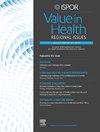马来西亚老年患者用药满意度问卷第2版的验证与跨文化适应:一项心理测试研究
IF 1.4
Q3 HEALTH CARE SCIENCES & SERVICES
引用次数: 0
摘要
目的评估马来语翻译版《用药治疗满意度问卷第2版》(TSQM v.2)的完整心理测量测试。方法这是一项横断面研究,涉及马来西亚一家教学医院门诊设置的429名老年患者的方便样本。所有患者均回答马来语版本(M-TSQM v.2)。仪器信度采用Cronbach’s alpha和复合信度进行检验。内容效度由专家小组评估,而收敛效度使用平均方差提取值进行测试。验证性因子分析用于确定因子效度和随后的结构效度。结果M-TSQM v.2中各域的scronbach’s α值均大于0.7,各域的复合信度值均大于0.6,表明M-TSQM v.2具有较好的内部一致性。4个域的11个条目的验证性因子分析显示因子负荷可接受(≥0.6),证实了4因子维度的存在。应用层次验证性因子分析,从绝对适应度、增量适应度和简约适应度三个指标验证了模型的拟合效果。结论M-TSQM v.2是评估马来语人群治疗满意度的有效、可靠和心理测量学上良好的工具。因此,考虑到它是一种通用的测量工具,它可以被关键地用于捕捉马来西亚患者治疗满意度的真实水平,而不管他们的发病率如何。本文章由计算机程序翻译,如有差异,请以英文原文为准。
Validation and Cross-Cultural Adaptation of Treatment Satisfaction Questionnaire for Medication Version 2 Among Older Adult Patients in Malaysia: A Psychometric Testing Study
Objectives
To assess the full psychometric testing of the translated Malay version of Treatment Satisfaction Questionnaire for Medication version 2 (TSQM v.2).
Methods
This is a cross-sectional study involving a convenience sample of 429 older adult patients at outpatient settings of a teaching hospital in Malaysia. All patients answered the Malay version (M-TSQM v.2). The instrument reliability was tested using Cronbach’s alpha and composite reliability. Content validity was assessed by a panel of experts, whereas convergent validity was tested using the average variance extracted values. Confirmatory factor analysis was used to determine factorial validity and subsequently construct validity.
Results
Cronbach’s α for all the domains in the M-TSQM v.2 yielded a value above 0.7, and all domains exhibit a composite reliability value above 0.6, which indicate a good internal consistency. The confirmatory factor analysis of the 11 items in the 4 domains demonstrated acceptable factor loading (≥0.6), confirming the 4-factor dimensionality. The applied hierarchical confirmatory factor analysis proved that the model was good fit based on the absolute, incremental, and parsimonious fitness indices.
Conclusions
The M-TSQM v.2 is a valid, reliable, and psychometrically sound instrument for assessing treatment satisfaction among Malay-speaking populations. Therefore, it could be utilized crucially to capture the trueness level of treatment satisfaction in Malaysian patients regardless of their morbidity status, given that it is a generic measurement tool.
求助全文
通过发布文献求助,成功后即可免费获取论文全文。
去求助
来源期刊

Value in health regional issues
Pharmacology, Toxicology and Pharmaceutics-Pharmacology, Toxicology and Pharmaceutics (miscellaneous)
CiteScore
2.60
自引率
5.00%
发文量
127
 求助内容:
求助内容: 应助结果提醒方式:
应助结果提醒方式:


